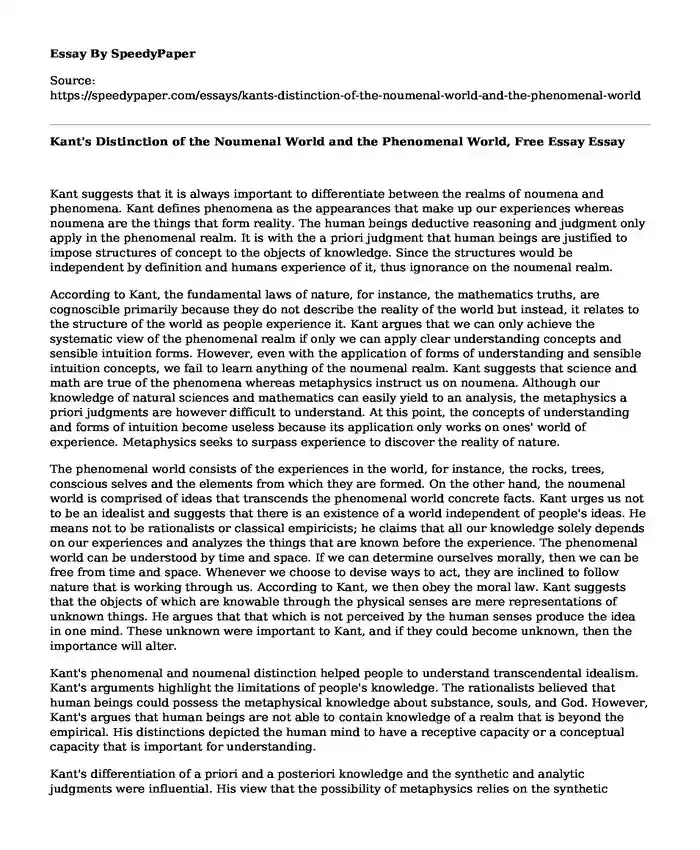
| Type of paper: | Essay |
| Categories: | Philosophers Immanuel Kant |
| Pages: | 3 |
| Wordcount: | 813 words |
Kant suggests that it is always important to differentiate between the realms of noumena and phenomena. Kant defines phenomena as the appearances that make up our experiences whereas noumena are the things that form reality. The human beings deductive reasoning and judgment only apply in the phenomenal realm. It is with the a priori judgment that human beings are justified to impose structures of concept to the objects of knowledge. Since the structures would be independent by definition and humans experience of it, thus ignorance on the noumenal realm.
According to Kant, the fundamental laws of nature, for instance, the mathematics truths, are cognoscible primarily because they do not describe the reality of the world but instead, it relates to the structure of the world as people experience it. Kant argues that we can only achieve the systematic view of the phenomenal realm if only we can apply clear understanding concepts and sensible intuition forms. However, even with the application of forms of understanding and sensible intuition concepts, we fail to learn anything of the noumenal realm. Kant suggests that science and math are true of the phenomena whereas metaphysics instruct us on noumena. Although our knowledge of natural sciences and mathematics can easily yield to an analysis, the metaphysics a priori judgments are however difficult to understand. At this point, the concepts of understanding and forms of intuition become useless because its application only works on ones' world of experience. Metaphysics seeks to surpass experience to discover the reality of nature.
The phenomenal world consists of the experiences in the world, for instance, the rocks, trees, conscious selves and the elements from which they are formed. On the other hand, the noumenal world is comprised of ideas that transcends the phenomenal world concrete facts. Kant urges us not to be an idealist and suggests that there is an existence of a world independent of people's ideas. He means not to be rationalists or classical empiricists; he claims that all our knowledge solely depends on our experiences and analyzes the things that are known before the experience. The phenomenal world can be understood by time and space. If we can determine ourselves morally, then we can be free from time and space. Whenever we choose to devise ways to act, they are inclined to follow nature that is working through us. According to Kant, we then obey the moral law. Kant suggests that the objects of which are knowable through the physical senses are mere representations of unknown things. He argues that that which is not perceived by the human senses produce the idea in one mind. These unknown were important to Kant, and if they could become unknown, then the importance will alter.
Kant's phenomenal and noumenal distinction helped people to understand transcendental idealism. Kant's arguments highlight the limitations of people's knowledge. The rationalists believed that human beings could possess the metaphysical knowledge about substance, souls, and God. However, Kant's argues that human beings are not able to contain knowledge of a realm that is beyond the empirical. His distinctions depicted the human mind to have a receptive capacity or a conceptual capacity that is important for understanding.
Kant's differentiation of a priori and a posteriori knowledge and the synthetic and analytic judgments were influential. His view that the possibility of metaphysics relies on the synthetic senses has impacted his philosophy. It was a response to Hume's skepticism and Berkeley's idealism. His distinction created a divided philosophical landscape that made room for philosophical views that were more balanced. This balanced philosophical view paved the way for the avoidance of extremes. Kant's change of focus to subjects' form objects through the cognitive capacities was influential in his philosophy, phenomenology, sociology, and constructivism. His phenomena and noumenal distinction contributed to the social philosophy. His philosophical contributions continue to be discussed.
The distinction played a vital role in structuring the reality that is so familiar which is so difficult for people to see the crucial insight as suggested by Kant. It helped overturn the philosophical views of the contemporaries and his predecessors. It helped revolutionize the worldview. His distinction was used in the protest of the rationalist and empirical traditions. He searched for the moral absolutes and failed to realize the local, experimental and emotional world. He applied old ideas of reason and logic with no regard no or little understanding to the scientific world. He maintained the justification of people in the application of forms of understanding in making a priori judgments and determinations of experience. His transcendental idealism for metaphysical concepts such as casualty and substance created structures that we impose on things to experience these things as appearances. His philosophy provided defense for freedom of will through the theoretical means and grounded freedom of morality. It helps to replace the logical proof of the existence of God with the argument of morals.
Cite this page
Kant's Distinction of the Noumenal World and the Phenomenal World, Free Essay. (2022, Feb 23). Retrieved from https://speedypaper.com/essays/kants-distinction-of-the-noumenal-world-and-the-phenomenal-world
Request Removal
If you are the original author of this essay and no longer wish to have it published on the SpeedyPaper website, please click below to request its removal:
- The Scientific Skeptic, Essay Example
- Essay Sample about Importance of Sports for Teenagers
- Free Essay on Clinical Social Work Theories
- Real Estate Law Essay, Free Example
- Article Review Essay Example: Verizon Data Breach Investigations Report 2018
- Free Essay Commemorating Nikola Tesla and the Contribution of His Inventions in the Modern World
- Free Essay. Development History of Foxconn Company
Popular categories




